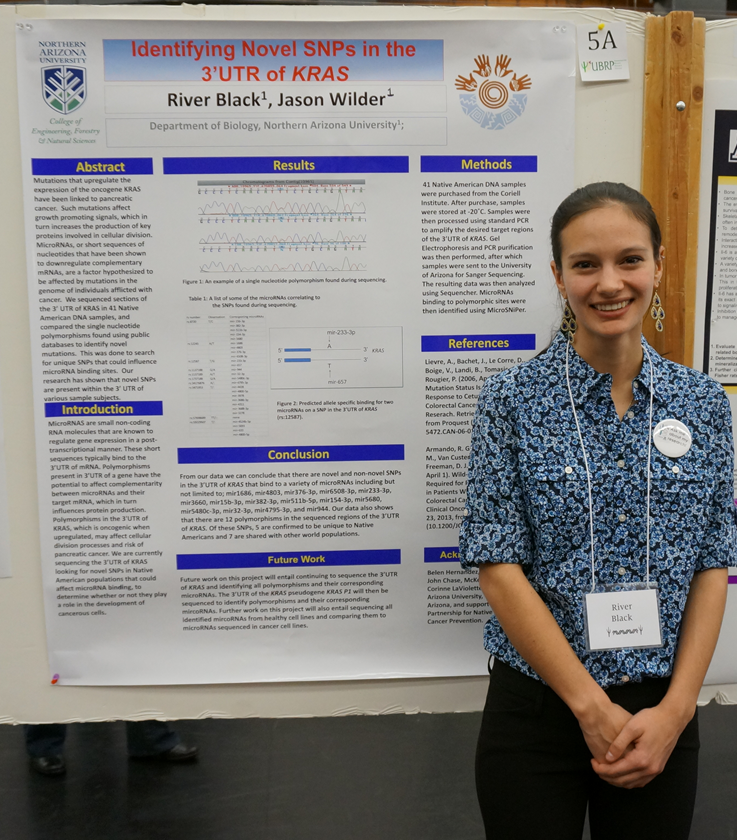Functional genetic variants as modifiers of prostate cancer progression in Native Americans

Project Co-leaders
NAU
Jason Wilder, Ph.D. Associate Professor, Department of Biological Sciences, College of Engineering, Forestry, & Natural Sciences
UACC
Ronald Heimark, Ph.D. Professor, Department of Surgery, Vice Chair of Surgical Research, College of Medicine
Background
Prostate cancer rates vary widely among races in the United States. Among all races, prostate cancer is clinically variable and can range from localized disease that does not require active treatment to aggressive disease associated with a high risk of mortality. Prostate cancer is the most common form of cancer diagnosed among U.S. men, and family history has been found to be the single most significant predictor of prostate cancer risk. This suggests that inherited genetic variants play a strong role in determining a man’s risk of developing prostate cancer. Genetic studies have found numerous specific genetic variants that are associated with prostate cancer risk. While many of these variants are relatively common, they individually contribute only a small amount to one’s cancer risk. Moreover, studies have found that many genetic risk factors for prostate cancer vary significantly in their frequency across different races. In these studies Native American populations have not been analyzed. There is a need to understand the molecular mechanisms underlying clinically aggressive prostate cancer in all men, including Native Americans.
Objective
Our goal is to better understand the genetic and molecular risk factors that correlate with aggressive prostate cancer. Our experimental approach will characterize genetic biomarkers and risk factors of particular importance to Native American populations.
Glossary of study terms
- ·Cancer risk factor: Any attribute that affects an individual’s risk of cancer (for example, smoking is a risk factor for lung cancer)
- Genetic cancer risk factor: A genetic trait that can be passed from one generation to the next and is associated with increased cancer risk
- Genetic variant: Any difference in the genetic makeup of individuals, specifically in the sequence of DNA. Genetic variants are often called polymorphisms or alleles or SNPs (single nucleotide polymorphisms)
- Genome-wide association studies (GWAS): Studies aimed at identifying the particular genetic variants that act as risk factors for any inherited trait, including cancer susceptibility
- Protein-coding gene: A part of the genome that encodes the instructions for creation of a protein. Protein-coding genes are comprised of DNA that is transcribed to RNA which is then translated to a protein
- Non-coding RNA (ncRNA) gene: A part of the genome that is transcribed into RNA, but does not encode a protein. ncRNA gene products often have important regulatory effects on other genes
- MicroRNA (miRNA): A non-coding RNA molecule that is very small and can silence protein-coding genes via RNA-RNA pairing. miRNAs are created through precursor stages that include pri-miRNA and then pre-miRNA
- MicroRNA Response Element (MRE): A region of a gene that can bind with a microRNA; when an MRE binds to a microRNA the associated gene is typically silenced
- Long-noncoding RNA (lncRNA): A non-coding RNA molecule that is large (>200 nucleotides) and can influence the activity of protein-coding genes in many different ways
- Competitive endogenous RNA (ceRNA): RNA molecules (typically including RNA from protein-coding genes and/or long-noncoding RNAs) that compete with one another to bind with microRNAs via a shared MRE
- Stem cell: Cells that can self-renew to form more stem cells and these undifferentiated cells can differentiate into specialized cell types
- Cancer stem cells (CSCs): CSCs are tumor cells that have properties associated with normal stem cells
